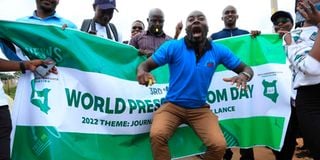Premium
Let’s celebrate community media journalists for their work on SGBV

Journalists march during a peaceful procession to mark World Press Freedom Day in Kisii Town on May 03, 2022. They called for safeguarding of media freedoms and upholding safety of journalist as the country heads to the election.
What you need to know:
- Giving journalists the leeway to do their work independently is a key step towards free and fair polls.
- Working jointly with community-based journalists and other key stakeholders is likely to have a positive impact in Kenya.
As Kenyan journalists joined the international community yesterday in celebrating this year’s World Press Freedom Day, it was not lost on them that the coming weeks, up to August 9 and September — the political transition month — will be rough and hectic.
Covering a general election is never a walk in the park. Political players are looking to “ensure” their side is covered objectively and with fairness. It’s usually a tricky balancing act.
With all indications pointing to a highly contested August 9 poll, it is fundamental that the key political players and stakeholders — the government and the Independent Electoral and Boundaries Commission (IEBC) —guarantee the safety and security of journalists against poll-related violence.
And this guarantee should include protection against verbal attacks aimed at individual journalists by politicians and meant to incite the public against the targeted media personality. Giving journalists the leeway to do their work independently, free from any form of threats and intimidation as they cover the third General Election under the 2010 Constitution, is a key step towards free and fair polls. The unpredictability of political developments in such an extraordinary election also calls for continuous engagement with the media.
Promote gender equality
At the same time, there’s a category of journalists and media houses that serve their communities with exemplary results, but the wider society hardly acknowledges their work. This does not, however, distract the community media journalists from their primary role of informing and educating the public at the grassroots level.
Community media, mostly radio stations, do excellent work in their localities, especially on sexual and gender-based violence (SGBV), which is rampant in informal settlements. They are also outstanding in areas where female genital cutting is prevalent. Here, the journalists work with local activists to educate communities in a bid to curb the practice and promote gender equality and the rights of women and girls.
Interactions with some of the community media stations and their journalists, particularly those who work without the problematic interference by interest groups such as the ownership, tell the story of a positive journey of change.
They’ve been able to raise awareness within some of the heavily patriarchal societies on the dangers of subjecting girls to the ‘cut’, which results in child motherhood, forced “marriages” and lack of education for children. It’s critical to support community media in some of these areas where attitude change on the rights of girls and women is needed, especially in battling the ‘cut’, which the government wants eradicated before end of this year. While it’s clear that the government’s December deadline to eliminate the practice will not be met, it’s imperative to work with journalists based within those communities where the practice is prevalent. Progress, though slow, is clear.
Positive impact
Working jointly with community-based journalists and other key stakeholders is likely to have a positive impact in Kenya, by helping in the global effort to eliminate the practice by 2030.
The Global Media Campaigns (GMC) , which works with activists, has been quite effective in advocating against the practice with a focus on ending it, by using local media for amplification. GMC reports that intensified campaigns in Kuria have seen cases go down in recent weeks. This followed a shocker last December where a huge number of girls were subjected to the ‘cut’. At least 57 people were arrested and about 298 girls rescued before they could face the knife in an audacious act.
With the nation’s body and soul focused on the elections, it’s only fair to spare a thought for the community media journalists who have dedicated their efforts to battling SGBV.
Ms Rugene is a consulting editor and founder, The Woman’s Newsroom Foundation; [email protected]





